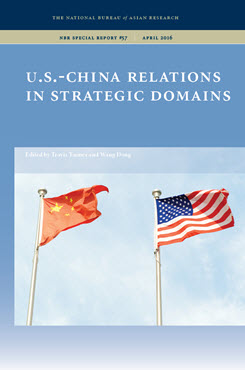Sino-U.S. Military-to-Military Relations
This essay examines U.S.-China military-to-military (mil-mil) relations, providing recommendations on strengthening cooperation in areas of shared interests and presenting mechanisms for managing tensions in areas of conflicting interests.
EXECUTIVE SUMMARY
MAIN ARGUMENT
The mil-mil relationship between the United States and China has seen periods of both cooperation and conflict since its inception during the Cold War. While the state of mil-mil relations hinges largely on the overall state of the bilateral relationship, three decades of exchanges have revealed not only the inadvertent risks and shortcomings associated with these exchanges but also their utility and importance in maintaining stability in the Asia-Pacific and safeguarding U.S. interests. At the same time, these interactions have led to a deeper understanding of Chinese interests—and highlighted areas of convergence and divergence with U.S. interests. Acknowledgement of the limitations and differences has paved the way for a more sophisticated mil-mil relationship. Future steps—ones that are modest, incorporate shared goals, and avoid constraints—can contribute to a more effective mil-mil relationship that is optimal for both parties, bringing forth a new paradigm of U.S.-China engagement.
POLICY IMPLICATIONS
- The Sino-U.S. mil-mil relationship has matured over the years, bringing a heightened awareness of the importance of maintaining the relationship (and more restraint in suspending it) as well as an adaptability to change amid fluctuations in the strategic environment. This emerging adaptability suggests that a window of opportunity exists to foster a more robust mil-mil relationship—one that enhances regional stability and international security.
- Enhancing communication mechanisms between the two sides—for example, in mutually determining the correct mix of mil-mil activities or in clarifying interests to the other party—serves to reduce miscalculations and assuage differences.
- The nature of each country’s position vis-à-vis the other, both in the region and in the international system, results in inherently conflicting interests. A realistic approach to the relationship thus must be modest in its expectations.
Roy Kamphausen Senior Vice President for Research and Director of the Washington, D.C., office at the National Bureau of Asian Research.
Jessica Drun is a Bridge Award Fellow at the National Bureau of Asian Research.
NOTE: This essay presents the personal views of the authors.


